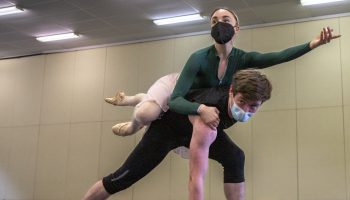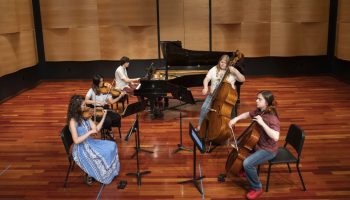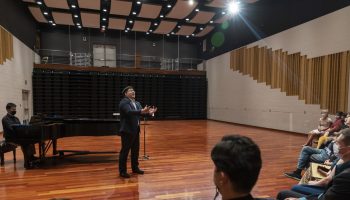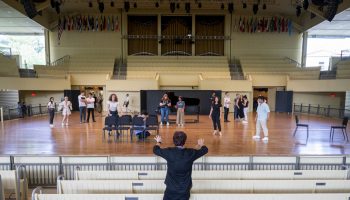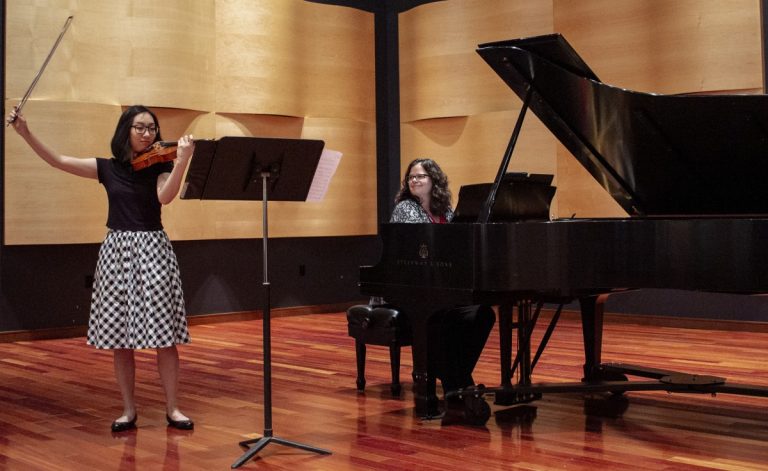
When musicians were forced to leave the energy of live performances behind, School of Music student Allyson Cohen found herself alone with her violin.
It first struck her as an obstacle, until she realized it could be an asset, too.
“The pandemic has been a time for me to really explore the solo violin repertoire,” Cohen said. “I don’t live with a pianist, so it’s nice to play something that is complete — just me and my violin.”
Cohen, along with violinist Darren Carter, trumpeter Riley Conley and cellist Alexander Smith will take to the digital stage at 7 p.m. Thursday, July 16, on the CHQ Assembly Virtual Porch.
The first instrumental recital is an “open recital,” meaning students are allowed to play whatever piece they like. Cohen’s selection, Ellen Taaffe Zwilich’s “Fantasy” for solo violin, is a 21st-century piece commissioned as a compulsory work for the 2014 International Violin Competition of Indianapolis, the most recent work on the night’s program.
Cohen said 21st-century music explores a “whole different sound world” that has not been tapped into until recently.
“It can express so many things at once, which is why it might feel like sensory overload if you’re not used to it,” Cohen said. “I think the beauty of it is that if you take the time to listen to these pieces more than once, you begin to learn the essence of it. Understanding this music is something you earn.”
“Fantasy,” according to Cohen, shows off the range of the violin, all the way from the G string to the highest registers.
“It’s a very empowering piece, both to play and to listen to,” she said. “It has a really fun, contemporary jazzy element that is super melodic and understandable to non-musicians.”
Darren Carter, a violinist from Baylor University, chose the first movement from Bach’s 1802 Violin Sonata No. 3 in C major, BWV 1005. Out of Bach’s three violin sonatas, this is the only one that is in a major key.
Carter said although it’s a rather slow movement, the overall tone is “uplifting in nature.”
“I love that this piece has a constant, pulsating rhythm that goes through the entire piece, but on each beat, there’s a new chord that grows from the last one,” he said. “It’s a very calming piece because your ear knows what to expect.”
Carter said playing Bach is a challenge, because a musician must “bring out the right voice within the chord.”
“One of the hardest parts about playing Bach is finding a way to make it sound balanced and even, because the violin can’t sustain four notes at once,” he said. “You have to be able to break the chord in such a way that two and two sound as if it were four.”
Alexander Smith, a student from the Blair School of Music, will play the second movement from Dmitri Shostakovich’s 1934 Sonata for Cello and Piano in D minor, Op. 40. Smith said it’s one of Shostakovich’s last works without “political intent or bias at play.”
“He wrote it right after a fight with his wife, so it’s a dance, but it’s ironic and sarcastic,” he said. “I imagine it as him trying to get distance from his issues and have fun, but the darkness he is ignoring looms in the background.”
Making it sound simple, Smith said, is the hardest part.
“The important thing is to keep the sense of dance and the folk-melody that he composed this piece with in mind,” he said. “There is an antagonistic three-beat rhythm, but you can’t get caught up with the technicalities.”
Compositions from male composers like Bach and Shostakovich are just that — classic. But what hasn’t been seen “until now,” Cohen said, are female composers, such as Zwilich, who were also creating music — whether it be chamber, orchestra or solo pieces — alongside their male colleagues.
“It’s something special to be able to give light to these well-deserving women who are writing amazing things,” Cohen said. “At the same time, you play your piece and the audience has no idea if it’s written by a man or a woman, a Black person or a white person. It doesn’t matter. It’s the music that speaks.”

